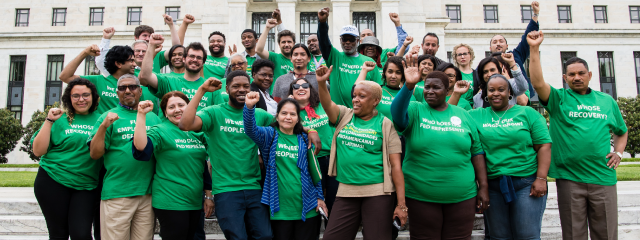Blog
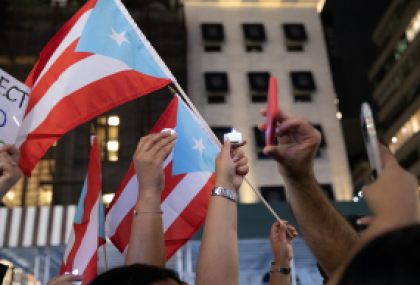
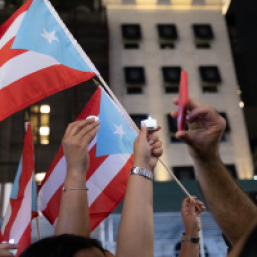
Last month, CPD affiliates and allies came together to commemorate the third anniversary of Hurricane Maria, which devastated the island of Puerto Rico and resulted in over 3,000 deaths and exacerbated an ongoing economic crisis.
On September 16, CPD affiliates Make the Road PA, CASA, Action NC, and Make the Road NV joined forces with the Power 4 PR coalition to host a phone bank to connect with Puerto Ricans living in the diaspora about the need to participate in the upcoming elections and to continue to push for a just recovery for the island. That same week, CPD worked with Hedge Clippers, CUFFH, NYCC and Latino Justice PRLDEF to release a letter signed by lawyers urging New York Attorney General, Letitia “Tish” James to investigate the role of hedge funds on Puerto Rico's debt crisis and prosecute any corruption. This letter was later followed by a community letter joined by many CPD affiliates representing hundreds of thousands of Puerto Ricans in the diaspora elevating the demand for the Attorney General to investigate.
Finally on September 22, CPD affiliate members from Make the Road NY, Make the Road CT, CASA, Make the Road NV, Action NC, NYCC, CUFHH, Make the Road PA joined a community popular education training for affiliates to learn about Puerto Rico and get activated about bringing justice to the island.
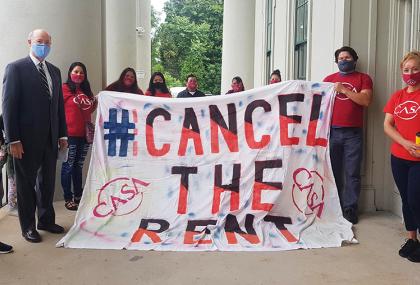
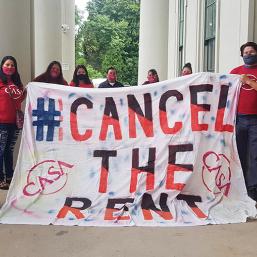
On September 1, affiliates across the CPD network, Unemployed Action, and League of Heroes—two projects of CPD/A— organized a national day of action to demand immediate relief for families across the United States through eviction protections, rent and mortgage cancellation and action by the Senate to develop and enact a federal relief package that puts people first.
Safe, affordable, decent housing is an anchor for every family’s ability to thrive. Yet, Congress continues to fail our communities as another month passes with no relief in sight for families experiencing unemployment and threats of eviction. Experts estimate that there could be 30-40 million people evicted in the next 6 weeks if there is no federal, state, or local action. In order to prevent the worst housing crisis this country has ever seen, government officials and corporate landlords must act to cancel rent and evictions for public health and protection of Black, Latinx and Indigineous communities across the country. Will you join us to fight evictions?
Click here to tell the Senate to take action now!
Nearly 1,000 people joined us for a day of resistance to the crisis of government inaction that will lead to a mass eviction and economic crisis. Through grassroots statewide Eviction Defense Networks (EDN), organizers are calling on eviction and housing courts across the country to remain closed, and for evictions and rent to be cancelled for the duration of the COVID-19 crisis.
Our affiliates have already taken action to protect tenants from eviction. In Chicago, Kenwood Oakland Community Organization in partnership with the Lift the Ban Coalition, organized an occupation of the local eviction court for 5 days, and won an extension of the eviction moratorium. CPD affiliates in Florida, Pennsylvania, Nevada, New York, California, Michigan, Illinois, Louisiana, Washington D.C., North Carolina, Washington, and Arkansas are keeping the pressure up on their Senators, banks, corporate landlords, the courts and other government officials to #CancelEvictions, #CancelRent, and #Savethe600.
There are tenants and homeowners who still need rent and mortgage cancellation. Learn more about our campaign to help them here.
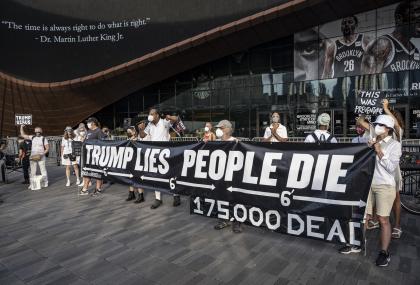
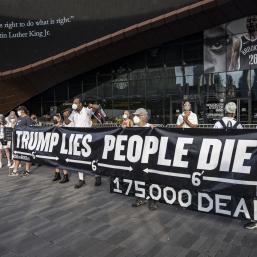
Since late spring, the Center for Popular Democracy has been engaging families who lost loved ones due to COVID-19 to demand accountability and justice in the pandemic response. This campaign, known as COVID Families, officially launched on Friday, August 21, where hundreds of people came together to March for the Dead in New York City.
Together, we marched through downtown Brooklyn, participated in a silent candlelit walk across the Brooklyn Bridge, and held a reading of names lost to COVID-19 at Foley Square in Manhattan.
Individual organizers from Rise and Resist, March for Truth, NYIC, MoveOn, and several Indivisible chapters came together to organize the event, while CPD affiliates CUFFH and NYCC endorsed the action. CPD helped to nationalize the event and sparked actions with affiliates like Delaware Alliance for Community Advancement, Arkansas Community Organization and Alaskans Take a Stand (formerly known as Alaska Grassroots Alliance), and independent events in Wisconsin, Maine, San Francisco and Los Angeles.
To date, 185,000 Americans have died from COVID-19, and those are only the confirmed cases on record. These numbers are devastating, especially as we watch the Trump administration avoid responsibility for containing the spread of COVID-19. Trump’s incompetence, malice, and inaction has led us here and he must be held accountable.
Click here to share your story and get involved with COVID Families.
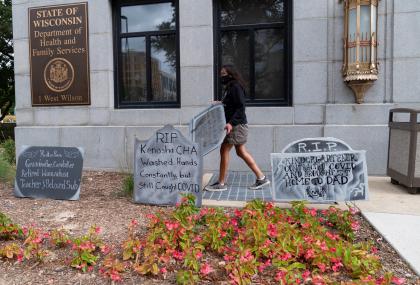
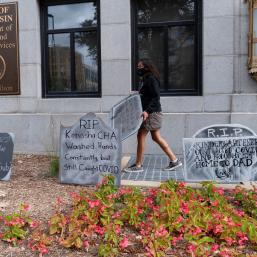
On August 3, CPD’s education justice campaign organized a national day of resistance with coordinated actions across 38 cities to demand a safe and equitable reopening of schools.
School districts across the country are opening schools either in person or virtually and our affiliates and partners across the country have already begun to make sure that the health and safety of our communities is given the priority it deserves.
Several CPD affiliates led protests outside of schools including: Step Up Louisiana, Make the Road New Jersey, Latinos Unidos Siempre, Florida Student Power Network, and Arkansas Community Organizations.
In Baltimore, Communities United joined their local teacher’s union as they rallied outside of Comcast. They demanded the company provide free services to students and educators. In Chicago, KOCO lifted up their quality of life demands outside of city hall demanding the safe reopening of schools, access to housing and healthcare. In Dallas, parents with Texas Organizing Project hosted a virtual town hall. In Los Angeles, parents with ACCE joined teachers and students outside at the LA Chamber of Commerce & the LA Unified school district for a protest demanding a safe reopening of schools. In Milwaukee, the students of Leaders Igniting Transformation supported teachers as they held a car caravan and die-in in front of the Department of Health Services. In Philadelphia 215PA joined a coalition of students, parents and teachers in a protest in front of their school district to demand asbestos and lead-free schools. In Vermont, Rights and Democracy joined their local teacher union at the state capitol to demand a delay to the start of school, cancellation of rent and mortgage payments, the tools needed for remote learning and more. And in West Virginia, Our Future West Virginia held several actions including a town hall with parents advocating for a safe reopening.
These actions were sparked by a growing momentum to support students, families, and educator's ability to lay out our own reimagined vision of public school safety. Stay tuned for our next steps as an education justice movement.
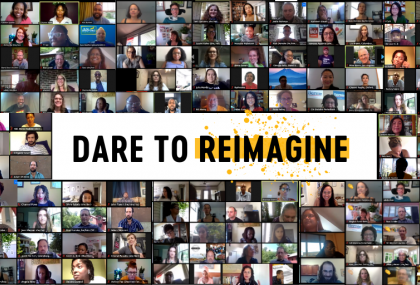
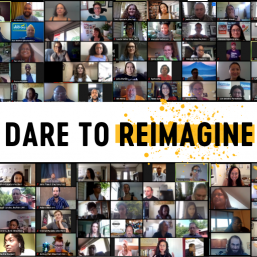
On August 13-15, Local Progress did something it’s never done before: Host hundreds of local elected officials and community partners for a 3-day convening virtually!
Local Progress, a project of CPD, is a movement of local elected officials advancing a racial and economic justice agenda through all levels of local government. The virtual event had nearly 400 Local Progress members and community partners representing 38 states. There was too much gold to capture in just one newsletter article but you can relive some of our favorite moments here. And, if you’re looking for some inspiration and radical joy, we HIGHLY recommend you watch the closing session with former LP member Rep. Ayanna Pressley! Read more on our blog.
Local Progress’ convening was just the beginning of a process to co-create a powerful agenda that defines what it means to govern as a progressive and what our world can and will look like when equity and justice are at the core of our systems, institutions, governance, and public power.
Over the next couple of months, Local Progress will continue to work with its members to build out this agenda. Stay tuned for the public launch in early December.
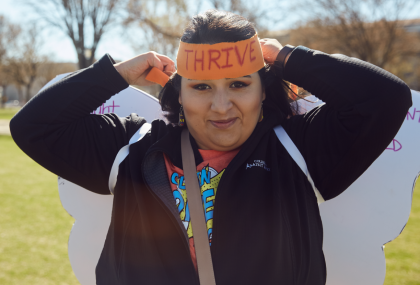
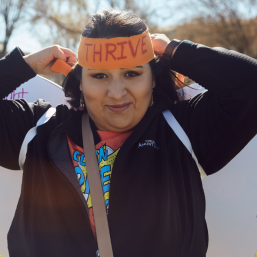
CPD is fighting injustice on many fronts. We’ve supported protesters who put their lives and bodies on the front lines demanding our nation defunds the police and invests directly in impacted communities. We’ve supported our grassroots affiliates as they’ve joined together to create solutions to seemingly impossible problems. And we’re mobilizing Black & Brown voters to ensure our communities’ voices are represented at the ballot in November.
Support from people like you makes all of this work happen. By way of our partnership with FreeWill there’s a unique way for you to support the future you want to see—and it costs nothing today. By creating a gift in your will to the Center for Popular Democracy, you are making a bold commitment to the future of racial and economic justice in the United States. And to make the process easier, we’ve partnered with FreeWill, an innovative, online resource that guides you through writing a will in 20 minutes or less.
Learn more about FreeWill and a legacy at CPD today.
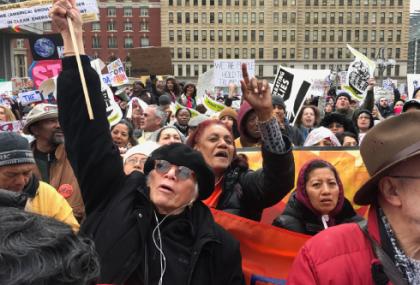
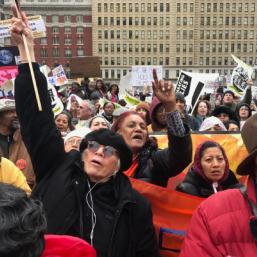
Dear Speaker Pelosi:
The undersigned grassroots, racial justice, and advocacy organizations, part of The People’s Coalition for Safety & Freedom committed to dismantling and replacing the harmful provisions of the 1994 Crime Bill, write again to note our grave concerns regarding Congress’ response to the devastating impact that the COVID-19 pandemic and police violence have wrought upon our communities.
In a previous letter to Congress last month, we laid out the harms of the Community Oriented Policing Services Program (“COPS Office”) over the last 25 years and questioned the moral and economic utility of Congress continuing to authorize federal funding for policing in this extraordinarily challenging moment.1
Our concerns and demands have only accelerated since. We have continued to witness the brutalization of community residents and protestors at the hands of heavily militarized local—and now federal—law enforcement, while no further economic relief has made its way to people and the virus continues to ravage our communities with no end in sight.2
Despite this reality, the House Subcommittee on Commerce, Justice, and Science has disturbingly recommended, and the House is now considering authorizing potentially billions of dollars for policing, including $343 Million for the COPS Office and hundreds of millions of dollars through the Byrne JAG program.3 This appropriation is in addition to the hundreds of millions of dollars in federal and local law enforcement funding contained in the Department of Homeland Security budget also being contemplated this week.4
As Congress negotiates and passes its annual appropriations and next iteration of the COVID-19 recovery package, we urge you—yet again—to reverse course and stop fueling our nation’s policing, criminalization, and incarceration crises through funding allocations.
We demand that Congress: cease federal funding of local law enforcement and to restrict this dangerous administration, including its Department of Justice and Department of Homeland Security, from further deployment of federal agents in cities across the nation.
Specifically we are calling on Congress, through this appropriations period, to:
- End the Community Oriented Policing Services Office that currently is used to hire, retain, and train local and state law enforcement, perpetuate the school-to-prison-and-deportation pipeline, and fund Operation Relentless Pursuit
- End federal funding for state and local enforcement hiring, training and equipment through the Byrne JAG Program
- End any programs for federal funding for law enforcement in the Department of Homeland Security Budget, including State Homeland Security Program, Urban Area Security Initiative, and Operation Stonegarden
- End the 1033 Military Transfer program
- Pass Reps. Pressley, Ocasio-Cortez and Liu’s Amendments to H.R. 7617 that would begin to reign in the harms of the COPS Office.5 We note our disappointment in the Rules Committee not advancing Rep. Pressley’s sensible amendment to shift COPS Office money allocated for hiring more police towards supporting young people.
In our previous correspondence, we laid out how damaging the COPS Hiring Program in particular has been on Black communities specifically: flooding our streets with upwards of 100,000 new police officers6—which has served to only increase the incidents of police brutality; accelerating and maintaining the school-to-prison-and-deportation pipeline by saturating schools with police officers; and putting budgetary pressures on local governments that result in the under-resourcing of housing, education, and other basic needs.
On top of these devastating impacts of the COPS Office, we note that Attorney General Bill Barr recently announced his new ‘Operation LeGend,’ which is a nearly identical initiative to ‘Operation Relentless Pursuit’ (funded by the COPS Office and one we previously condemned and brought to your attention).7 Both operations, as well as President Trump’s unconstitutional use of Customs and Border Patrol deployment, represent brazen attempts by the administration to flood our cities with militarized federal law enforcement agents, intimidate and suppress protest, and further occupy neighborhoods with policing and paramilitary forces.8 We are deeply concerned about the likelihood that Trump and Barr will utilize these programs to not only escalate violent crack down on protected protest, but to intimidate and suppress the vote in the November election.
The events in Portland and the threats being levied towards other U.S. cities have made clear the true intent of these federal initiatives: t o quiet opposition and stifle democracy itself. Congress must restrict Trump and Barr’s ability and resources for these types of dangerous programs—and can do so in part by defunding the COPS Program and other programs under the Department of Homeland Security.
Moreover, it would be unconscionable for Congress to ignore and ultimately reject the central tenet of the largest social movement in U.S. history if it were to now send hundreds of millions of dollars to reinforce police budgets, police power, and police departments’ violent behavior. Indeed, in the wake of the deaths of George Floyd, Breonna Taylor, and countless others, cities have risen up to meet the demands of the Black Lives Matter movement. Minneapolis’ City Council has voted to dismantle its police department and build a whole new public safety apparatus9. The Los Angeles City Council voted to cut their police department by $150 million in response to city residents’ demand.10 Seattle has passed resolutions indicating they seek to cut its police department’s budget by 50%.11 Were Congress to continue funding policing, particularly at the levels it is considered this appropriations period, it would represent a staggering and unforgiveable undermining of this social justice movement and the needs of communities nationwide.
Instead, Congress should focus its attention on fully funding and extending critical initiatives such as unemployment insurance, rental assistance, resources for COVID-19 testing, state and local financial support, community public safety alternatives, and preparations for a safe return to school for our children. Sending massive resources to already bloated local police forces or to Trump and Barr’s handpicked paramilitary forces at this moment, would be disastrous for public safety, public health, and for our democracy. We implore you to act accordingly.
Sincerely,
Center for Popular Democracy PolicyLink Equity Action Network Action Center on Race and the Economy (ACRE) Detroit Action MomsRising Black Alliance for Just Immigration (BAJI) Rights & Democracy (NH & VT) Maryland Communities United (Baltimore, MD) Black Leaders Organizing for Communities (Milwaukee, WI) Law for Black Lives Flint Rising (MI) New Florida Majority The National Council for Incarcerated and Formerly Incarcerated Women and Girls BYP100 Action Fund JustLeadershipUSA (JLUSA)
cc:
Senate Majority Leader Mitch McConnell Senate Minority Leader Chuck Schumer Chair José E. Serrano, House Committee on Appropriations Subcommittee on Commerce, Justice, Science and Related Agencies Vice Chair Patrick Leahy, Senate Committee on Appropriations Chair Nita Lowey, House Committee on Appropriations Chairman Jerry Moran, Senate Committee on Appropriations Subcommittee on Commerce, Justice, Science and Related Agencies Chairman Richard Shelby, Senate Committee on Appropriations Ranking Member Robert Aderholt, House Committee on Appropriations Subcommittee on Commerce, Justice, Science and Related Agencies
________________
1 Letter to House Judiciary Committee, (June 9, 2020), https://populardemocracy.org/sites/default/files/FINAL%20Letter%20to%20Congress%20--%20COPS%2 0program.pdf 2 Christian Davenport, Gregory Scuggs, Protests Explode Across The Country; Police Declare Riots in Seattle, Portland, The Washington Post (Jul. 26, 2020), https://www.washingtonpost.com/nation/2020/07/25/seattle-police-declare-riot-renewed-black-lives-ma tter-protests/ 3 Fact Sheet: Supporting Police Reform In The Fiscal Year 2021 Appropriations Bills, House of Representatives Committee on Appropriations (Jul. 17, 2020), https://appropriations.house.gov/news/fact-sheets/supporting-police-reform. 4 Budget-In-Brief Fiscal Year 2021, Department of Homeland Security (Feb. 10, 2020), https://www.dhs.gov/sites/default/files/publications/fy_2021_dhs_bib_web_version.pdf. 5 Committee on Rules, United States House of Representatives, H.R. 7617 - Defense, Commerce, Justice, Science, Energy and Water Development, Financial Services and General Government, Homeland Security, Labor, Health and Human Services, Education, Transportation, Housing, and Urban Development Appropriations Act, 2021, https://rules.house.gov/bill/116/hr-7617 6 Press Release, President Clinton Announces New Crime Brill Grants to put Police Officers on the Beat, DOJ (Oct. 12, 1994), https://www.justice.gov/archive/opa/pr/Pre_96/October94/590.txt.html 7 Press Release, Attorney General William P. Barr Announces Launch of Operation Legend, DOJ (Jul. 8, 2020), https://www.justice.gov/opa/pr/attorney-general-william-p-barr-announces-launch-operation-legend. 8 Andrew Selsky, Gillian Flaccus, Mayor of Portland to Trump: Get your troops out of our city, The Associated Press (July 18, 2020), https://apnews.com/95ed013d58a00db0d85ddfd14ab51d2c 9 Tommy Beer, Minneapolis City Council Unanimously Votes To Replace Police With Community-Led Model, Forbes (June 12, 2020) https://www.forbes.com/sites/tommybeer/2020/06/12/minneapolis-city-council-unanimously-votes-to-repla ce-police-with-community-led-model/#3e1254ac71a5 10 Los Angeles City Council votes to slash LAPD budget by $150 million, CBS News (July 1 2020), https://www.cbsnews.com/news/los-angeles-city-council-votes-to-slash-lapd-budget-by-150-million/ 11 Daniel Beekman, Majority of Seattle council pledges to support Police Department defunding plan laid out by advocates, The Seattle Times (July 9 2020), https://www.seattletimes.com/seattle-news/politics/majority-of-seattle-council-pledges-to-support-police-d epartment-defunding-plan-laid-out-by-advocates/
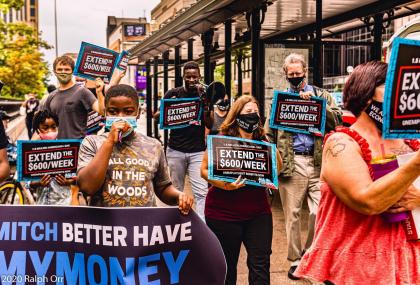
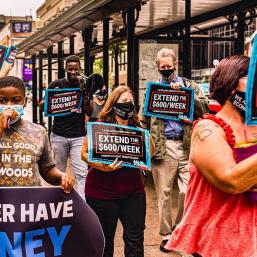
In March, after millions of people across the country began losing their jobs in the wake of the COVID-19 pandemics, the federal government stepped in with a critical lifeline that we knew then was inadequate—unemployed workers would receive an additional $600 per week in extra unemployment benefits. Now, while the pandemic continues to rage on and with more than more than 30 million unemployed workers and their families lives on the line, President Trump and Senate Majority Leader McConnell are pushing to cut that money off tomorrow. They want to force workers back to work before it is safe by taking away their benefits.
The Center for Popular Democracy’s (CPD) Unemployed Action campaign is helping unemployed workers fight back against these proposed cuts. We’re demanding immediate relief, good jobs, and to fix a fundamentally broken and rigged economy that works for all of us, not just the super-rich and corporations. Together with more than 12,000 unemployed workers in our Facebook group and CPD affiliates from across our network, we have organized dozens of virtual town halls with elected officials to sound the alarm on this impending disaster, helped thousands of workers call their congressional representatives, and amplified the testimony of people who will be pushed into poverty if Congress cuts off this critical lifeline.
For millions of families across the country, $600 per week will make a world of difference to whether they are able to cover rent, pay utility bills, see a doctor when they’re sick, or put food on the table. Failure to extend unemployment benefits would also widen our country’s racial wealth gap: Black and Brown workers are more likely than white workers to face unemployment and have fewer savings. Join the workers of Unemployed Action’s calls to extend this $600 life preserver by calling your Senator today.
CLICK TO CALL MY SENATOR
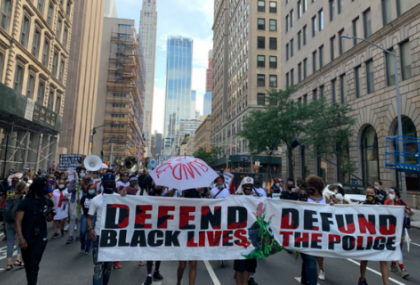
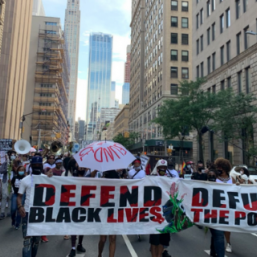
Across the country, local governments are beginning to reimagine and redefine what public safety looks like in our society. Through Local Progress—a CPD project and movement of local elected officials advancing a racial and economic justice agenda through all levels of local government—our team is working directly with local elected officials. In the last month, the Baltimore City Council approved $22.4 million in cuts to the police department budget, the Portland City Council is on track to shift $4.8 million from police to a new community-based street response program, and the Denver School Board and the Minneapolis School Board voted to end their contract with their local police departments. All the while, CPD affiliates are creating the conditions necessary for winning change by catalyzing people into direct action to defund police, remove police from our schools and invest in communities.
And when the Movement for Black Lives put out a call ahead of Juneteenth to honor Black freedom and resistance by taking to the streets, CPD affiliates and staff joined millions of people around the country for a weekend of action in defense of Black life. Nearly half of CPD’s staff stepped into key roles to support these efforts, from designing turn out scripts, sending thousands of turn out texts, creating popular education learning communities, moving grants to Black-led affiliates on the frontlines around the country, and getting our message out via the media, to coordinating direct actions. And from North Carolina to Arkansas, Maine to Nevada, 34 CPD Network affiliates led beautiful and powerful actions with calls to defund police, invest in black communities, and for Trump to resign.
Action NC Action NC participated in the Juneteenth Youth Experience with other local Charlotte organizations. They highlighted investing in Black youth, including free food, live music and performances. Action NC also held a Juneteenth virtual event to discuss Black history and highlight the importance of this moment in history.
Action Now Institute Action Now occupied the corner of 63rd & Halsted “Englewood” and worked to uplift their Black community. They called for all elected officials to work on their behalf. They fed the community, gave away care packages, drummed in the spirit of ancestors and called for the mayor to put Black people first.
Arkansas Community Organizations (ACO) ACO and other organizations in Little Rock marched from MacArthur Park, where the city had removed a confederate statue a day earlier, to the Mosaic Templars Cultural Center which includes a museum that celebrates the lives of Black people in Arkansas.
CASA CASA supported the Washington, D.C. action led by SPACES, they showed up in solidarity with the demands of M4BL. CASA PA also supported actions in York, PA and Baltimore, MD to defund the police and invest in community solutions.
Center for Coalfield Justice (CCJ) CCJ held a legislative town hall with participation from their state senator and three state house members. The young black leaders they have been supporting all asked them questions around criminal and racial justice. All of the legislators committed to taking action and CCJ’s new, young leaders are excited to push them to be accountable to those commitments. CCJ also supported them in organizing a BLM march and rally in Canonsburg, PA. There were about 350 people who attended. This is one of the largest actions in this town for at least a decade. The last action that weekend was a BLM picket in Waynesburg, PA where about 70 people showed up.
Center on Policy Initiatives Staff actively supported other actions locally and built support for their ongoing county-level budget work in California.
Churches United for Fair Housing (CUFFH) CUFFH Action played a role in supporting the Celebrating Black Life event on Juneteenth in NYC Foley Square. They had a youth organizer named Asaur Burke join then as the first speaker to talk about his experience with NYPD in Williamsburg, Brooklyn and also demanding to #DefundThePolice in front of Speaker Corey Johnson's residence. There was a mural painted to pay respect to the Black lives lost and a band to remind us that revolution is joyful.
Communities Creating Opportunity (CCO) The day after Juneteenth, CCO held a day of action in Kansas City to honor the holiday and to consider the ways in which society must be transformed. CCO wants to ensure that there will never again be a question of whether Black Lives Matter and that this fight for equality, dignity, and full freedom will finally be realized in Kansas City and throughout the nation.
Delaware Alliance for Community Advancement (DelACA) DelACA spent much of the Juneteenth week in negotiations to get charges dropped on protests from a couple of weeks prior and ultimately won. DelACA was then asked by the Attorney General to help train police on how to interact with protesters and started work with protesters to understand how to properly plan protests and civil disobedience. The organization also began working on a youth and adult re-education program to help build power in Black and Brown communities as well as poor white communities.
Detroit Action Detroit Action held a Juneteenth Tele-Town Hall with guest speakers and a dynamic presentation on the history of Juneteenth.
Flint Rising Flint Rising helped coordinate a socially-distant motorcade that stretched for more than a mile to uplift Juneteenth, demand reparations for water warriors, and call for investments in Black communities.
Leaders Igniting Transformation (LIT) Since their establishment in 2018, LIT has been advocating tirelessly for the decriminalization of Black and Brown youth in Milwaukee Public Schools. LIT has mobilized hundreds of students to share their stories, take direct action and demand an investment into their success. On June 18th, LIT surpassed their previous biggest victory and succeeded in terminating all contracts between MPS and the Milwaukee Police Department.
Maine People's Alliance (MPA) MPA staff and volunteer leaders have worked to support the incredible organizing that has been happening across Maine, led largely by young Black Mainers, in response to George Floyd’s murder. In Lewiston, MPA organizer Mohamed Ali Ibrahim worked to provide support to Shukri Abdirahman, one of the organizers of a rally that drew nearly 1,000 people to the city. Local members and staff led a de-escalation team for the event. MPA Legislative Director Mohamed Nur joined a webinar for young Black leaders organized by Maine Youth Network to talk about opportunities for advancing racial justice priorities in the Maine legislature. MPA loaned staff to the national campaign working to organize coordinated events on Juneteenth. Additionally, MPA organizer Gen Lysen organized a Zoom training on direct action and de-escalation tactics that was attended by 40 people.
Make the Road Nevada (MRNV) Through unity and outreach with local partners, supporting Black-led actions, Juneteenth was not just a day, it was an action-filled week all leading up to a day filled with love and celebration! There were over 200 people at the Family BBQ on Juneteenth MRNV organized, and their staff played a critical role in pulling off the event, working behind the scenes to support the leadership of Black allies.
Make the Road New York (MRNY) MRNY participated in the Urban Youth Collaborative’s (UYC) virtual and in-person action on Juneteenth which centered policing issues. Members of their Youth Power project and the Parents in Action committee joined in to ask to defund NYPD.
Make the Road Pennsylvania (MRPA) MRPA led three actions during the week of Juneteenth. They led a protest and march on Juneteenth to #DefundThePolice in Philly. They also held two more actions over the weekend on Saturday demanding to defund the police and invest in Black communities.
Maryland Communities United The Baltimore Juneteenth Freedom Fest took place on Friday, June 19 starting with a march against police brutality from PennNorth (location in middle of Baltimore's 2015 uprising) and ending with a rally at Druid Hill Park, featuring youth poets, entertainers and speakers. The event was live streamed on Facebook and Instagram. Black-owned vendors joined us in Druid Hill Park, volunteers helped with the event and donated money for food, water and rental of a flatbed truck and sound equipment.
New Florida Majority (NFM) NFM collaborated with groups across the state to hold events all over Florida. Some of their events included a Defund the Police Juneteenth Rally in Fort Lauderdale, and a Melanin Mama’s Second Line March in Jacksonville to celebrate Black women, Black freedom, Black excellence and Black liberation.
New Virginia Majority (NVM) NVM participated in the "Speak Out in Defense of Black Lives" event in Virginia. This was a virtual rally held by organizations in Virginia which included music, calls to action, and personal stories and testimonies about what solidarity in Defense of Black Lives means at the moment.
New York Communities for Change (NYCC) NYCC supported many efforts on the week of Juneteenth. They marched to State Senator Todd Kaminsky’s office because he has taken over $100k from police unions and has been a barrier to passing criminal legal system reform. They also supported a Unity March and had members attend the Celebration of Black Life #DefundThePolice March in NYC.
Ohio Organizing Collaborative (OOC) OOC held a day of action on Juneteenth at the Cincinnati Police Departments’ shooting range. Community leaders led the crowd through protest and a mobile march where residents shared their stories and testimonies. Protestors then drove from the range to a nearby basketball court, where refreshments were served.
One Pennsylvania (OnePA) In the lead up to Juneteenth OnePA hosted popular education meetings with their members about the holiday and the demands. On June 20, One PA participated in the Say Her Name march in West Philadelphia to demand justice for Black women and femmes who are murdered and abused and walking through this world without the protections they deserve, specifically lifting up Remmie Fells, a Black Trans woman who was found murdered in Philly the week before. On Monday, June 22 One PA hosted a rally to demand #policefreeschools in Pittsburgh with about 275-300 folks in attendance.
Organization United for Respect (OUR) OUR amplified the M4BL demands on the social media platform, and organized to turn folks in their network out to actions within their cities across the country.
Organize Florida (OFL) The ENTIRE weekend was amazing with Juneteenth events for OFL. Throughout all our events and the state, we had thousands of folks show up (and show out). This was in deep collaboration with other groups as well.
Organizers in the Land of Enchantment (OLE) OLE worked with Building Power for Black NM and the All African Peoples’ Revolution Party to lift up the events they had planned. They also sent out an email blast with the demands and lifted up both the M4BL events and local events.
Our Future West Virginia (OFWV) Members of OFWV gathered in Charleston on Magic Island to celebrate their ancestors' liberation by calling for accountability and action from city leaders. Kanawha County youth spoke about Keep Us Safe (WV's 5-point plan) and to call for Mayor Goodwin's cooperation in the community's fight for true and complete liberation. OFWV also sent a group of organizers to the SPACES in Action DC protest to support and speak on the need for liberation.
Rights and Democracy 200 people marched through downtown Keene, NH to honor the history of Juneteenth. Organizers from Rights and Democracy have made several demands, including a call for Trump to resign, for the local government to divest from police departments, and to invest into social programs, housing, and education. The protest was described as peaceful and safe.
Safe Places for the Advancement of Community and Equity (SPACES) SPACES joined with other community based organizations to coordinate an action on the Trump Hotel. The action called for the Trump Hotel to pay for the MPD officers and sergeants guarding the building, as well as the use of police cars. An invoice was created and delivered to the hotel manager. The more than $4 million of taxpayer funds would be better used in community programs that benefit the low income families that live in the DC.
Step Up Louisiana Step Up Louisiana led "The Black Joy Experience" on Juneteenth by acknowledging the contributions of Black Americans to the social, economic, and political well being of the great state of Louisiana. They also held an event that weekend demanding to defund the police, invest in Black communities and demand the resignation of Donald Trump.
Sunflower Community Action Sunflower Community Action held a day of celebration in Kansas. In a joint action, Sunflower celebrated the history of Juneteenth while also celebrating the Supreme Court's most recent decision to uphold the DACA program.
Workers Defense Project/ Action Fund (WDP) The Workers Defense Project worked to support several actions on Juneteenth across the state of Texas. WDP supported actions led by local leaders on the ground (and online) in Austin, Houston, and Dallas.
Working Washington Working Washington supported and celebrated Juneteenth - they joined King County Equity Now Coalition to march in solidarity. This included a black graduation procession, a teach in, singers, dancers, performances and more.
In the last two months, we have seen historic movement towards police-free schools across the country. Minneapolis, Oakland, Denver, Seattle, Portland, Rochester, Milwaukee and other towns and cities around the country are on the path to ending policing in schools, and several CPD affiliates have been on the frontlines of the fight including Leaders Igniting Transformation in Milwaukee, WI, Urban Youth Collaborative in New York City, Latinos Unidos Siempre in Salem, Oregon, OnePennsylvania in Pittsburgh, PA, Make the Road Nevada in Las Vegas, and the Florida Student Power Network in Orange County, Florida.
At the same time, Trump and Betsy DeVos, the U.S. Secretary of Education, have been ramping up pressure in an attempt to force schools to open in the fall despite there being clear evidence that school districts are not adequately equipped to do so safely.
We are clear: for schools to safely reopen they must be police-free, adequately and equitably funded, and community centered. Below are snapshots of some of the incredible work being done across the CPD network, including a week of action for police-free schools last month. We are also gearing up for a national day of action on August 3rd, to demand nothing less than a safe return to schools. We hope all of you will join us in the fight for safe, equitable public education.
Leaders Igniting Transformation (LIT) (Milwaukee, WI): On June 18th, Leaders Igniting Transformation in Milwaukee made history! The Milwaukee Public School Board unanimously passed a resolution which ends all contracts between the Milwaukee Police Department and Milwaukee Public Schools. It also ends any contracts to buy or maintain criminalizing equipment, including metal detectors. The Board’s vote is a victory by and for Black and Brown students. This resolution is the culmination of 2.5 years of work by LIT youth leaders to defund police at MPS. Congratulations, LIT!
Urban Youth Collaborative (UYC) (New York, NY): Young people with UYC waged a powerful battle in the largest school district in the country, which spends $451 million per year policing students. For weeks leading up to the city council’s vote on the budget they held actions including: a plane fly over with the banner #POLICEFREESCHOOLS NOW, twitter series explaining policing in NYC Schools, call ins to city council members, illuminated near the City Hall encampment (#OccupyCityHall), banner dropped “Police Free Schools” at the Department of Education, and more. New York City failed its young people and passed a budget that will continue the rampant policing of Black and Brown young people. But, UYC will continue the fight until all schools are police-free.
Latinos Unidos Siempre (LUS), Salem, OR: The Black and Brown young people with LUS have been fighting hard. A video surfaced of one of the school board members wearing a blackface mask during an official school board meeting, which LUS publicised to draw attention to the racist behaviour of its school board members. LUS’s fight got national attention in VICE, and the video went viral. At a school board hearing, LUS turned out dozens of young people and more than 100 people submitted testimony, overwhelming against police in schools. Unfortunately, the board voted to keep funding police for now, but with a commitment to make a final decision on the presence of police in schools before the end of August. The young people have drawn their line: “We have been asked what would make us feel safe returning to schools...Black & Brown young people will not feel safe returning to school with police in schools and a racist school board.” Support them by sharing this twitter thread calling out the racist actions of the school board and sign their petition. They are close to winning this fight!
OnePennsylvania (OnePA), Pittsburgh, PA: OnePA hosted an amazing rally with more than 300 community members dancing, chanting and singing in the rain. See coverage here, here, here. Their call for police-free schools is beginning to echo loudly in Pittsburgh. After the rally, 73 people testified at the school board meeting demanding police-free schools. There were so many testimonies, the board had to split their meeting into two days! They also launched a petition, which currently has about 2,000 signatures. Sign their petition to show your support! Over the next few weeks, OnePA will be keeping up the pressure to win this fight, including during a school board hearing this coming Monday.
Make the Road Nevada’s Youth Power Project (MRNV), Las Vegas, NV: MRNV launched their police-free schools campaign! They held a rally (video) and turned out with forced to the School Board meeting. Clark County School District Police Department costs the district nearly $18.5 Million each year with 161 sworn law enforcement officers and 41 civilian officers. Young people demand an immediate removal of police from schools and for the district to dissolve its police department. Support Black and Brown young people in Nevada by signing their petition (bit.ly/policefree-ccsd) as their fight continues.
Florida Student Power Network (FLSPN), Orange County, FL: On June 20th, Florida Student Power Network members young people, parents, & community members joined The People 4oh7 to shut down the i4 Millenia Mall for 8 minutes 46 seconds - commemorating the amount of time George Floyd's neck was knelt upon by the MPD. FLSPN attended the Orange County Public School Board virtual meeting and made public comments demanding an end to police in schools. They’re launching a petition soon to build towards their July school board meeting. Keep an eye out for more!
We know that Make the Road New Jersey, Detroit Action, Make the Road Pennsylvania, and other affiliates are in this movement for police-free schools. The fight towards police free-schools will need all of us—our young people’s safety and futures depend on it.



